30 start with H start with H
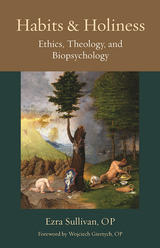
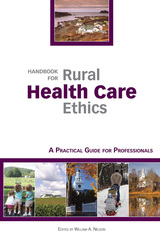
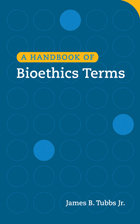
The term bioethics was first used in the early 1970s by biologists who were concerned about ethical implications of genetic and ecological interventions, but was soon applied to all aspects of biomedical ethics, including health care delivery, research, and public policy. Its literature draws from disciplines as varied as clinical medicine and nursing, scientific research, theology and philosophy, law, and the social sciences—each with its own distinctive vocabulary and expressions.
A Handbook of Bioethics Terms is a handy and concise glossary-style reference featuring over 400 entries on the significant terms, expressions, titles, and court cases that are most important to the field. Most entries are cross-referenced, making this handbook a valuable addition to the bookshelves of undergraduate and graduate students in health care ethics, physicians and nurses, members of institutional ethics committees and review boards, and others interested in bioethics.
A sampling of terms from the handbook: AbortionDNR (Do Not Resuscitate)Eugenics Gene therapy Living will Natural lawPrimum non nocere Single-payer systemSurrogate consent Schiavo case
Sample Definitions:
Formalism: In ethical theory, a type of deontology in which an action is judged to be right if it is in accord with a moral rule, and wrong if it violates a moral rule.
Xenograft: Organ or tissue transplanted from one individual to another individual of another species. (See Transplantation, organ and tissue)
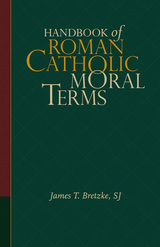
The Handbook of Roman Catholic Moral Terms contains more than 800 moral terms, offering concise definitions, historical context, and illustrations of how these terms are used in the Catholic tradition, including Church teaching and documents.
James T. Bretzke, SJ, places Catholic tradition in a contemporary context in order to illuminate the continuities as well as discontinuities of Church teaching and key directions of Catholic thought. The author also provides extensive cross-referencing and bibliographic suggestions for further research.
Designed to serve as a vital reference work for libraries, students and scholars of theology, priests and pastoral ministers, as well as all adults interested in theological enrichment or continuing education, the Handbook of Roman Catholic Moral Terms is the most comprehensive post–Vatican II work of its kind available in English.
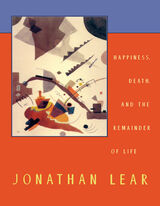
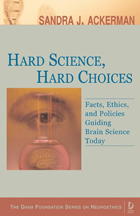
Top scholars and scientists in neuroscience and ethics convened at the Library of Congress in Washington, D.C., in May 2005. They included Michael Gazzaniga, director of the Center for Cognitive Neuroscience at Dartmouth College; Marcus Raichle of the Washington University School of Medicine in St. Louis; Harvard University provost Steven Hyman; Judy Illes, cofounder of the Stanford Brain Research Center; University of Virginia bioethicist Jonathan Moreno; Stacey Tovino of the Health Law and Policy Institute at the University of Houston Law Center; and Stanford law professor Hank Greely.
Ackerman weaves the invigorating arguments and discussions among these and other prominent scholars into a seamless and dynamic narrative. She reveals the wide array of issues that have emerged from recent research, including brain imaging, free will and personal responsibility, disease diagnosis and prediction, brain enhancement, and the potential social, political, and legal ramifications of new discoveries. Translating these complex arguments into an engrossing account of neuroethics, she offers a rare view of science—and ethics—in the making.

The editors of The Hauerwas Reader, therefore, have compiled and edited a volume that represents all the different periods and phases of Hauerwas’s work. Highlighting both his constructive goals and penchant for polemic, the collection reflects the enormous variety of subjects he has engaged, the different genres in which he has written, and the diverse audiences he has addressed. It offers Hauerwas on ethics, virtue, medicine, and suffering; on euthanasia, abortion, and sexuality; and on war in relation to Catholic and Protestant thought. His essays on the role of religion in liberal democracies, the place of the family in capitalist societies, the inseparability of Christianity and Judaism, and on many other topics are included as well.
Perhaps more than any other author writing on religious topics today, Hauerwas speaks across lines of religious traditions, appealing to Methodists, Jews, Anabaptists or Mennonites, Catholics, Episcopalians, and others.

What, exactly, does it mean to be human? It is an age-old question, one for which theology, philosophy, science, and medicine have all provided different answers. But though a unified response to the question can no longer be taken for granted, how we answer it frames the wide range of different norms, principles, values, and intuitions that characterize today's bioethical discussions. If we don't know what it means to be human, how can we judge whether biomedical sciences threaten or enhance our humanity?
This fundamental question, however, receives little attention in the study of bioethics. In a field consumed with the promises and perils of new medical discoveries, emerging technologies, and unprecedented social change, current conversations about bioethics focus primarily on questions of harm and benefit, patient autonomy, and equality of health care distribution. Prevailing models of medical ethics emphasize human capacity for self-control and self-determination, rarely considering such inescapable dimensions of the human condition as disability, loss, and suffering, community and dignity, all of which make it difficult for us to be truly independent.
In Health and Human Flourishing, contributors from a wide range of disciplines mine the intersection of the secular and the religious, the medical and the moral, to unearth the ethical and clinical implications of these facets of human existence. Their aim is a richer bioethics, one that takes into account the roles of vulnerability, dignity, integrity, and relationality in human affliction as well as human thriving. Including an examination of how a theological anthropology—a theological understanding of what it means to be a human being—can help us better understand health care, social policy, and science, this thought-provoking anthology will inspire much-needed conversation among philosophers, theologians, and health care professionals.
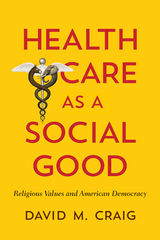
David M. Craig traveled across the United States to assess health care access, delivery and finance in this country. He interviewed religious hospital administrators and interfaith activists, learning how they balance the values of economic efficiency and community accountability. He met with conservatives, liberals, and moderates, reviewing their ideas for market reform or support for the Affordable Care Act. He discovered that health care in the US is not a private good or a public good. Decades of public policy and philanthropic service have made health care a shared social good.
Health Care as a Social Good: Religious Values and the American Democracy argues that as escalating health costs absorb more and more of family income and government budgets, we need to take stock of the full range of health care values to create a different and more affordable community-based health care system. Transformation of that system is a national priority but Americans have failed to find a way to work together that bypasses our differences. Craig insists that community engagement around the common religious conviction that healing is a shared responsibility can help us achieve this transformation—one that will not only help us realize a new and better system, but one that reflects the ideals of American democracy and the common good.

Health Care Ethics is a comprehensive study of significant issues affecting health care and the ethics of health care from the perspective of Catholic theology. It aims to help Christian, and especially Catholic, health care professionals solve concrete problems in terms of principles rooted in scripture and tested by individual experience; however, its basis in real medical experience makes this book a valuable resource for anyone with a general interest in health care ethics.
This fifth edition, which includes important contributions by Jean deBlois, C.S.J., considers everyday ethical questions and dilemmas in clinical care and deals more deeply with issues of women's health, mental health, sexual orientation, artificial reproduction, and the new social issues in health care. The authors devote special attention to the various ethical theories currently in use in the United States while clearly presenting a method of ethical decision making based in the Catholic tradition. They discuss the needs of the human person, outlining what it means to be human, both as an individual and as part of a community.
This volume has been significantly updated to include new discussions of recent clinical innovations and theoretical issues that have arisen in the field:
• the Human Genome Project• efforts to control sexual selection of infants• efforts to genetically modify the human genotype and phenotype• the development of palliative care as a medical specialty• the acceptance of non-heart beating persons as organ donors• embryo development and stem cell research• reconstructive and cosmetic surgery• nutrition and obesity• medical mistakes• the negative effects of managed care on the patient-physician relationship• recent papal allocution regarding care of patients in a persistent vegetative state and palliative care for dying patients

This fourth edition of Health Care Ethics provides a contemporary study of broad and major issues affecting health care and the ethics of health care from the perspective of Catholic teachings and theological investigation.
It aims to help Christian, and especially Catholic, health care professionals solve concrete problems in terms of principles rooted in Scripture and tested by individual experience.
Since the last edition of Health Care Ethics, there have been many changes in the fields of health care medicine and theology that have necessitated a fourth edition. Ashley and O'Rourke have revised their seminal work to address the publication of significant documents by the Church and the restructuring of the health care system.
Features of the revised fourth edition:
• Discusses significant Church documents issued since the third edition includes "The Splendor of Truth" (Veritatis Splendor), and the "Gospel of Life" (Evangelium Vitae); the "Instruction on the Vocation of Theologians"; the Catechism of the Catholic Church; and the Revised Ethical and Religious Directives for Catholic Health Services.
• Examines the implications of managed care techniques.
• Probes such changes in the practice of medicine as the new emphasis on preventive care, the involvement of individuals in their own care, greater use of pharmaceuticals in psychiatry, and the greater role of genetics in diagnosis and prognosis.
• Explores the quest for more compassionate care of the dying.
• Updates the bibliography.

This book illuminates issues in medical ethics revolving around the complex bond between healer and patient, focusing on friendship and other important values in the healing relationship. Embracing medicine, philosophy, theology, and bioethics, it considers whether bioethical issues in medicine, nursing, and dentistry can be examined from the perspective of the healing relationship rather than external moral principles.
Distinguished contributors explore the role of the health professional, the moral basis of health care, greater emphasis on the humanities in medical education, and some of the current challenges facing healers today.

Arguing that health care should be a human right rather than a commodity, the distinguished contributors to this volume call for a new social covenant establishing a right to a standard of health care consistent with society's level of resources. By linking rights with limits, they offer a framework for seeking national consensus on a cost-conscious standard of universal medical care. The authors identify the policy implications of recognizing and implementing such a right and develop specific criteria to measure the success of health care reform from a human rights perspective.
Health Care Reform also offers specific and timely criticism of managed competition and its offspring, the Clinton plan for health care reform. Because health care reform will inevitably be an ongoing process of assessment and revision—especially since managed competition has not been implemented elsewhere—this book will last beyond the moment by providing vital standards to guide the future evolution of the health care system.

In the 1850s, "Drapetomania" was the medical term for a disease found among black slaves in the United States. The main symptom was a strange desire to run away from their masters. In earlier centuries gout was understood as a metabolic disease of the affluent, so much so that it became a badge of uppercrust honor—and a medical excuse to avoid hard work. Today, is there such a thing as mental illness, or is mental illness just a myth? Is Alzheimer's really a disease? What is menopause—a biological or a social construction?
Historically one can see that health, disease, and illness are concepts that have been ever fluid. Modern science, sociology, philosophy, even society—among other factors—constantly have these issues under microscopes, learning more, defining and redefining ever more exactly. Yet often that scrutiny, instead of leading toward hard answers, only leads to more questions. Health, Disease, and Illness brings together a sterling list of classic and contemporary thinkers to examine the history, state, and future of ever-changing "concepts" in medicine.
Divided into four parts—Historical Discussions; Characterizing Health, Disease, and Illness; Clinical Applications of Health and Disease; and Normalcy, Genetic Disease, and Enhancement: The Future of the Concepts of Health and Disease—the reader can see the evolutionary arc of medical concepts from the Greek physician Galen of Pergamum (ca. 150 ce) who proposed that "the best doctor is also a philosopher," to contemporary discussions of the genome and morality. The editors have recognized a crucial need for a deeper integration of medicine and philosophy with each other, particularly in an age of dynamically changing medical science—and what it means, medically, philosophically, to be human.
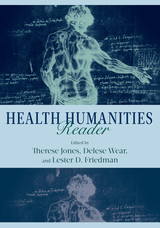
In Health Humanities Reader, editors Therese Jones, Delese Wear, and Lester D. Friedman have assembled fifty-four leading scholars, educators, artists, and clinicians to survey the rich body of work that has already emerged from the field—and to imagine fresh approaches to the health humanities in these original essays. The collection’s contributors reflect the extraordinary diversity of the field, including scholars from the disciplines of disability studies, history, literature, nursing, religion, narrative medicine, philosophy, bioethics, medicine, and the social sciences.
With warmth and humor, critical acumen and ethical insight, Health Humanities Reader truly humanizes the field of medicine. Its accessible language and broad scope offers something for everyone from the experienced medical professional to a reader interested in health and illness.
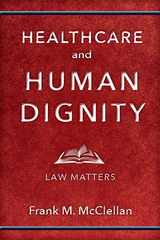
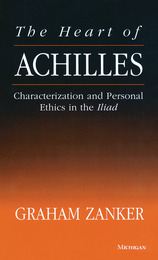
"[Zanker] investigates altruistic behavior in the epic with professional sophistication but in a way that makes his investigation available to a wide audience from undergraduates to advanced scholars. . . . [A] very useful interpretative study." --Choice
Graham Zanker is Senior Lecturer in Classics, University of Canterbury, New Zealand.

Exploring the moral foundations of the healing relationship, Edmund D. Pellegrino and David C. Thomasma offer the health care professional a highly readable Christian philosophy of medicine. This book examines the influence religious beliefs have on the kind of person the health professional should be, on the health care policies a society should adopt, and on what constitutes healing in its fullest sense.
Helping and Healing looks at the ways a religious perspective shapes the healing relationship and the ethics of that relationship. Pellegrino and Thomasma seek to clarify the role of religious belief in health care by providing a moral basis for such commitment as well as a balancing role for reason. This book establishes a common ground for believers and skeptics alike in their dedication to relieve suffering by showing that helping and healing require an involvement in the religious values of patients. It clearly argues that religion provides crucial insights into medical practice and morality that cannot be ignored, even in our morally heterogeneous society.
Central to the authors' message is the concept of patients' vulnerabilities and the need to help them recover not only from the disease but also from an existential assault on their personhood. They then show how this understanding can move caregivers to view their professions as vocations and thereby change the nature of health care from a business to a community of healing.
Physicians, nurses, administrators, clergy, theologians, and other health professionals and church leaders will find this volume helpful for their own reflections on the role of religion in the health care ministry and for making a religious commitment integral to their professional lives.

Long argues that higher education is a moral enterprise and that, as such, it must be guided by a commitments to what is morally right and fundamentally good, not just by what is necessary in intellectual or financial endeavors.
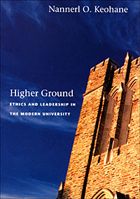
Keohane regards colleges and universities as intergenerational partnerships in learning and discovery, whose compelling purposes include not only teaching and research but also service to society. Their mission is to equip students with a moral education, not simply preparation for a career or professional school.
But the modern era has presented universities and their leadership with unprecedented new challenges. Keohane worries about access to education in a world of rising costs and increasing economic inequality, and about threats to academic freedom and expressions of opinion on campus. She considers diversity as a key educational tool in our increasingly pluralistic campuses, ponders the impact of information technologies on the university’s core mission, and explores the challenges facing universities as they become more “global” institutions, serving far-flung constituencies while at the same time contributing to the cities and towns that are their institutional homes.
Reflecting on the role of contemporary university leaders, Keohane asserts that while they have many problems to grapple with, they will find creative ways of dealing with them, just as their predecessors have done.
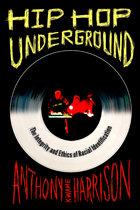
Hip Hop Underground is a vivid ethnography of the author's observations and experiences in the multiracial world of the San Francisco underground hip hop scene. While Anthony Kwame Harrison interviewed area hip hop artists for this entertaining and informative book, he also performed as the emcee "Mad Squirrel." His immersion in the subculture provides him with unique insights into this dynamic and racially diverse but close-knit community.
Hip Hop Underground examines the changing nature of race among young Americans, and examines the issues of ethnic and racial identification, interaction, and understanding. Critiquing the notion that the Bay Area underground music scene is genuinely "colorblind," Harrison focuses on the issue of race to show how various ethnic groups engage hip hop in remarkably divergent ways—as a means to both claim subcultural legitimacy and establish their racial authenticity.
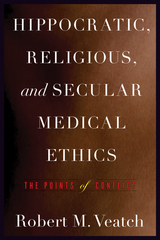
Where should physicians get their ethics? Professional codes such as the Hippocratic Oath claim moral authority for those in a particular field, yet according to medical ethicist Robert Veatch, these codes have little or nothing to do with how members of a guild should understand morality or make ethical decisions. While the Hippocratic Oath continues to be cited by a wide array of professional associations, scholars, and medical students, Veatch contends that the pledge is such an offensive code of ethics that it should be summarily excised from the profession. What, then, should serve as a basis for medical morality?
Building on his recent contribution to the prestigious Gifford Lectures, Veatch challenges the presumption that professional groups have the authority to declare codes of ethics for their members. To the contrary, he contends that role-specific duties must be derived from ethical norms having their foundations outside the profession, in religious and secular convictions. Further, these ethical norms must be comprehensible to lay people and patients. Veatch argues that there are some moral norms shared by most human beings that reflect a common morality, and ultimately it is these generally agreed-upon religious and secular ways of knowing—thus far best exemplified by the 2005 Universal Declaration on Bioethics and Human Rights—that should underpin the morality of all patient-professional relations in the field of medicine.
Hippocratic, Religious, and Secular Medical Ethics is the magnum opus of one of the most distinguished medical ethicists of his generation.

One of the hallmarks of the classical Spanish theater is a vengeful conception of personal honor. This view, to some extent characteristic of Spanish life and thinking of the time, finds its fullest expression in those dramas called “honor plays.” In this study Donald R. Larson analyzes the honor plays of Lope de Vega, stellar playwright of Spain's Golden Age, and demonstrates in the course of them a consistent line of dramatic development.
Representative works have been selected from each of the three categories into which Lope's plays are customarily grouped—the early plays, those of the middle period, and the late plays. Larson's approach to the comedias is both critical and historical; it allows him to chart the evolution of the group as a whole, while providing significant new insights into the individual works. In the words of Bruce W. Wardropper, he gives us “a rare opportunity to follow one of the multiple threads through the Lopean labyrinth.”
As Lope is one of the giants of European literature and ought to be of interest to all students of the drama, the book contains complete English translations of passages quoted in the original Spanish.
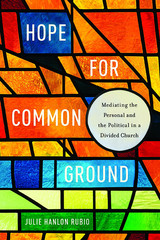
Much like the rest of the country, American Catholics are politically divided, perhaps more so now than at any point in their history. In this learned but accessible work for scholars, students, and religious and lay readers, ethicist Julie Hanlon Rubio suggests that there is a way beyond red versus blue for orthodox and progressive Catholics. In a call for believers on both sides of the liberal-conservative divide to put aside labels and rhetoric, Rubio, a leading scholar in marriage and family for more than twenty years, demonstrates that common ground does exist in the local sphere between the personal and the political.
In Hope for Common Ground, Rubio draws on Catholic Social Thought to explore ways to bring Catholics together. Despite their differences, Catholics across the political spectrum can share responsibility for social sin and work within communities to contribute to social progress. Rubio expands this common space into in-depth discussions on family fragility, poverty, abortion, and end-of-life care. These four issues, though divisive, are part of a seamless worldview that holds all human life as sacred. Rubio argues that if those on different sides focus on what can be done to solve social problems in “the space between” or local communities, opposing sides will see they are not so far apart as they think. The common ground thus created can then lead to far-reaching progress on even the most divisive issues—and help quiet the discord tearing apart the Church.
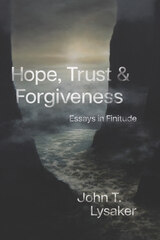
As ethical beings, we strive for lives that are meaningful and praiseworthy. But we are finite. We do not know, so we hope. We need, so we trust. We err, so we forgive. In this book, philosopher John T. Lysaker draws our attention to the ways in which these three capacities—hope, trust, and forgiveness—contend with human limits. Each experience is vital to human flourishing, yet each also poses significant personal and institutional challenges as well as opportunities for growth. Hope, Trust, and Forgiveness explores these challenges and opportunities and proposes ways to best meet them. In so doing, Lysaker experiments with the essay as a form and advances an improvisational perfectionism to deepen and expand our ethical horizons.
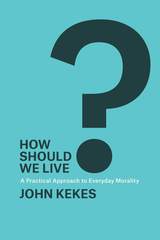
Kekes argues that ideal theories are abstractions from the realities of everyday life and its problems. The well-known arenas where absolute ideals conflict—dramatic moral controversies about complex problems involved in abortion, euthanasia, plea bargaining, privacy, and other hotly debated topics—should not be the primary concerns of moral thinking. Instead, he focuses on the simpler problems of ordinary lives in ordinary circumstances. In each chapter he presents the conflicts that a real person—a schoolteacher, lawyer, father, or nurse, for example—is likely to face. He then uses their situations to shed light on the mundane issues we all must deal with in everyday life, such as how we use our limited time, energy, or money; how we balance short- and long-term satisfactions; how we deal with conflicting loyalties; how we control our emotions; how we deal with people we dislike; and so on. Along the way he engages some of our most important theorists, including Donald Davidson, Thomas Nagel, Christine Korsgaard, Harry Frankfurt, Charles Taylor, Alasdair MacIntyre, and Bernard Williams, ultimately showing that no ideal—whether autonomy, love, duty, happiness, or truthfulness—trumps any other. No single ideal can always guide how we overcome the many different problems that stand in the way of living as we should. Rather than rejecting such ideals, How Should We Live? offers a way of balancing them by a practical and pluralistic approach—rather than a theory—that helps us cope with our problems and come closer to what our lives should be.
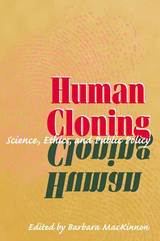
In this concise volume, experts on all sides of the debate make arguments for why we should either pursue, regulate, or ban the cloning of human beings. From this collection, readers will gain a clearer picture of the history of cloning in agriculture and animal science, the various biological procedures that are encompassed by the term "cloning," the philosophical arguments in support of and opposed to cloning humans, and the considerations that should inform discussions about public policy matters related both the cloning research and to human cloning itself.
Balancing scientific detail with philosophical argument, Human Cloning succinctly outlines what cloning is and is not (e.g., cloning does not produce identical individuals), what has led to recent scientific developments, what is now possible, and what ethical dilemmas cloning presents. Opponents claim that cloning subverts human dignity, makes a mockery of spousal love, and poses serious safety hazards. Proponents cite a range of potential benefits, such as producing transplant tissue that is less likely to be rejected, extending current techniques of artificial insemination, and controlling genetic abnormalities to prevent birth defects.
Cloning itself is not new, but as the science of cloning continues to advance--and as human cloning thus inches closer to reality--we are compelled to consider its implications for society. Human Cloning is a lucid, substantive guide to this contentious and potentially revolutionary issue.

The major humanitarian crises of recent years are well known: the Shoah, the killing fields of Cambodia, the Rwandan genocide, the massacre in Bosnia, and the tsunami in Southeast Asia, as well as the bloody conflicts in South Sudan, Syria, and Afghanistan. Millions have been killed and many millions more have been driven from their homes; the number of refugees and internally displaced persons has reached record levels. Could these crises have been prevented? Why do they continue to happen? This book seeks to understand how humanity itself is in crisis, and what we can do about it.
Hollenbach draws on the values that have shaped major humanitarian initiatives over the past century and a half, such as the commitments of the International Committee of the Red Cross, Oxfam, Doctors Without Borders, as well as the values of diverse religious traditions, including Catholicism, to examine the scope of our responsibilities and practical solutions to these global crises. He also explores the economic and political causes of these tragedies, and uncovers key moral issues for both policy-makers and for practitioners working in humanitarian agencies and faith communities.
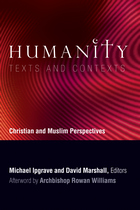
Humanity: Texts and Contexts is a record of the 2007 Singapore “Building Bridges” seminar, an annual dialogue between Muslim and Christian scholars cosponsored by Georgetown University and the Archbishop of Canterbury. This volume explores three central questions: What does it mean to be human? What is the significance of the diversity that is evident among human beings? And what are the challenges that humans face living within the natural world?
A distinguished group of scholars focuses on the theological responses to each of these questions, drawing on the wealth of material found in both Christian and Islamic scriptures. Part one lays out the three issues of human identity, difference, and guardianship. Part two explores scriptural texts side by side, pairing Christian and Islamic scholars who examine such themes as human dignity, human alienation, human destiny, humanity and gender, humanity and diversity, and humanity and the environment. In addition to contributions from an international cast of outstanding scholars, the book includes an afterword by Archbishop Rowan Williams.
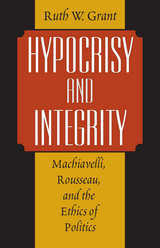
READERS
Browse our collection.
PUBLISHERS
See BiblioVault's publisher services.
STUDENT SERVICES
Files for college accessibility offices.
UChicago Accessibility Resources
home | accessibility | search | about | contact us
BiblioVault ® 2001 - 2024
The University of Chicago Press









